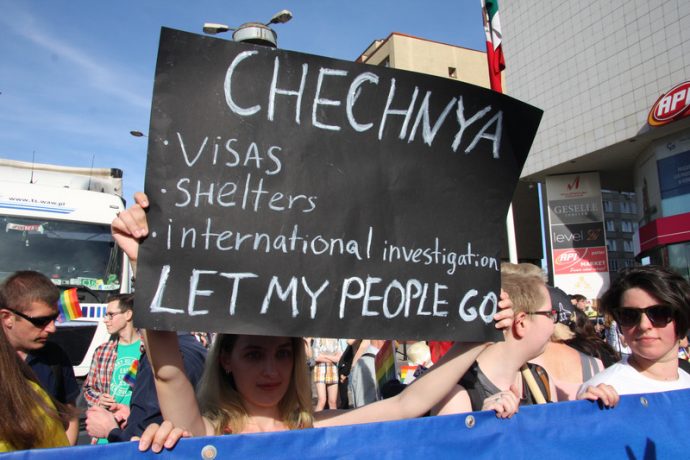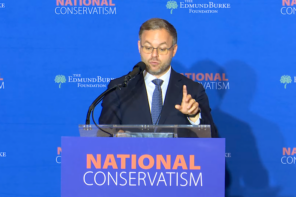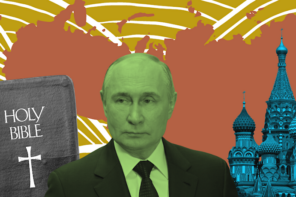Brian Brown, president of the International Organization for the Family, the parent organization to the World Congress of Families, bragged in a fundraising email about the organization working with the government of Hungarian strongman Viktor Orban and praising the campaign Orban has been waging what philanthropist George Soros calls an “unrelenting propaganda campaign” against him, including “seeking to deny accreditation to his Soros-funded university.” As with its backing of Vladimir Putin in Russia and partnership with oppressive regimes at the UN, the global religious right continues to make clear that they are willing to sacrifice essential freedoms in the name of “traditional” views on sexuality, gender, and family.
Kuwait: ‘Morals Committee’ claims to have deported 76 gay men this year
The head of a “morals committee” announced that Kuwait has “deported 76 homosexuals and shut down 22 massage parlours this year,” reports Gulf News.
During the raids, the committee members found and seizezd sex toys, women’s underwear and make up used by the men.
“We have a zero-tolerance policy towards any morally objectionable activities and we will not be lenient with anyone who breaks the rules or puts the health of Kuwaiti citizens and residents at risk,” Al Dhufairi said.
The story quotes a Kuwait University staff member supporting the crackdown:
“We live in a conservative country and, therefore, we should uphold specific morals.”
Homosexuality and cross-dressing are against the law in Kuwait and other Gulf Cooperation Council (GCC) countries—Bahrain, Oman, Qatar, Saudi Arabia and the UAE.
In Kuwait, convicted homosexuals could face up to 10 years in prison, if the engaged parties are under the age of 21.
Haiti: Senate votes to ban marriage and pro-LGBT advocacy, citing ‘deep religious beliefs’
The Senate voted to ban same-sex couples from getting married and to an “public demonstration of support” for homosexuality, affirming the trend we noted last week that attacks on LGBT equality often go hand-in-hand with attacks on other human rights. Excerpts from AFP’s report:
“All senators are opposed to same-sex marriage, so this simply reflects the commitments the senators made during their campaigns,” Senate President Youri Latortue told AFP. Haiti’s constitution established a secular republic but the country is marked by deep religious beliefs. “Although the state is secular, it is people of faith who are the majority,” Latortue said, stressing the commonly held belief in Haiti that homosexuality is a Western practice only.
“A country has to focus on its values and traditions. Some people in other countries see it differently, but in Haiti, that’s how it’s seen.” Haitian law already defines marriage as a union between a man and a woman, making it unclear what consequences the bill, if passed, would have in practice.
Australia: Christian lobbying group warns ruling coalition to stand firm on marriage equality vote
Prime Minister Malcolm Turnbull and his Liberal party continued to refuse to allow a parliamentary vote on marriage equality, insisting on a nonbinding national plebiscite to be held first. He said that he would personally campaign for a “yes” – pro-marriage-equality – vote.
Rights advocates see the plebiscite as both a delaying tactic forced by a hard right-wing minority and a strategy to undermine political support.
Opponents of the plebiscite argue that the government-funded advertising campaigns for the cases for and against would give authority to bigoted and homophobic arguments. Supporters say it would give ordinary people a voice in a debate dominated by activists. From AP’s Rod McGuirk:
Rights advocates see the plebiscite as both a delaying tactic forced by a hard right-wing minority and a strategy to undermine political support.
Opponents of the plebiscite argue that the government-funded advertising campaigns for the cases for and against would give authority to bigoted and homophobic arguments. Supporters say it would give ordinary people a voice in a debate dominated by activists. …
Lyle Shelton, managing director of the Australian Christian Lobby, said his advocacy group had collected 55,000 signatures on a petition demanding a plebiscite.
Sheldon handed the petition to Sen. Cory Bernardi, leader of the minor Australian Conservatives party, to present to the Senate. Bernardi has said he would vote against gay marriage regardless of what the plebiscite found.
Opponents of a national plebiscite, in which voting would be mandatory, also oppose a government alternative, a voluntary vote by mail. According to new reports, lawyers for pro-marriage-equality groups plan to file a legal challenge to a mail vote if it is not specifically authorized by the Senate, and anti-marriage equality groups are threatening a campaign against the ruling coalition if it goes ahead with anything other than a full plebiscite:
Aside from the legal threat, the Turnbull Government is facing pressure from the Australian Christian Lobby.
The ACL is threatening to campaign against the Coalition if it goes ahead with anything other than a plebiscite on the same-sex marriage issue.
The group has gathered 55,000 signatures on a petition urging the government to stick to its election promise to hold a plebiscite on marriage equality, or risk losing the support of “millions” of voters, The Australianreports.
Ireland & Northern Ireland: Marriage equality ‘a matter of time’ as young Protestants’ support grows
Irish Prime Minister Leo Varadkar, who is gay, said while visiting Belfast in Northern Ireland for a pride for a pride celebration that it is “only a matter of time” before marriage equality reaches Northern Ireland, where to date the DUP party has used a controversial parliamentary mechanism to block it. Reuters noted that his visit “comes a day after the British government for the first time ordered a rainbow gay rights flag to be flown above its main office in Belfast—Stormont House—to coincide with the Belfast Pride Festival.”
The Guardian reported that according to new polling, “younger pro-union Protestant voters in Northern Ireland are increasingly turned off” by unionist politicians and parties’ “social conservatism on issues such as gay rights and abortion.” The survey found that 63 percent of Protestant voters in Northern Ireland support marriage equality.
Jamaica: Pro-LGBT conference on church and sexuality laws planned
LGBT equality activist Maurice Tomlinson announced plans for an international conference in Jamaica that will examine the role that churches have played in imposing and maintaining colonial-era anti-LGBT laws that ironically, “are now viewed as demonstrating the moral and political independence of Commonwealth countries FROM Britain.” Jamaica has been the host of anti-LGBT conferences attended by U.S.-based religious right leaders.
Keynoting the October 12-13 conference will be The Anglican Primate of the West Indies John Holder.
Writes Tomlinson, “We hope the conference will be the start of a dialogue to end these unjust laws wherever there is a Christian presence because ‘Until we are all free, we are none of us free.’”
Anglican Communion: Gay couple’s church wedding expected to rile Communion’s conservatives
The first wedding by a same-sex couple in an Anglican Church in Britain is expected to further exacerbate tensions within the Anglican Communion. Excerpts from The Guardian’s Cathering Pepinster reporting:
The first gay Anglican wedding in Britain took place last week, just a day after the archbishop of Canterbury said the continuing row in the Anglican Communion over same-sex relationships was an “intractable problem”.
The couple, known as “Mark and Rick”, got married on Tuesday at a Eucharist service where the Rev Markus Dunzkofer, of the Scottish Episcopal church, officiated. Dunzkofer, rector of St John’s, in Princes Street, Edinburgh, said “history was made” at the wedding, held in the chapel of a Dalhousie hotel. …
Mark and Rick’s marriage is the first in the Scottish Episcopal church, which is part of the Anglican Communion. The Episcopal church announced in June that it was allowing gay weddings after its synod voted to amend canon law on marriage. It agreed that the doctrine stating that marriage was between one man and one woman should be removed.
The vote sparked a backlash from traditionalists, with the conservative Anglican group Gafcon announcing that it was appointing a missionary bishop, committed to keeping marriage heterosexual, to work in Scotland.
The archbishop of Canterbury, Justin Welby, has struggled to keep the worldwide Anglican Communion together over the issue of same-sex relationships, with many African bishops voicing opposition to gay weddings and to clergy being involved in gay relationships themselves.
Israel: Police detain suspected troublemakers in advance of Jerusalem pride celebration
Just “hours” before last week’s pride parade in Jerusalem, police arrested a man from central Israel for making “online threats” against attendees. From i24 News:
While Tel Aviv’s gay pride parade, the second largest in the world, is one of the city’s annual highlights, it’s counterpart in Jerusalem, a city sacred to Jews, Muslims and Christians, is always smaller and more controversial.
Jerusalem’s pride parade was the target of violence in 2015, ultra-Orthodox extremist Yishai Shlissel stabbed to death 16-year-old Shira Banki and injured five others.
DW reported that hundreds of security personnel were deployed to protect an estimated 10,000 marchers, and says that a dozen people were taken into custody “on suspicion of trying to disrupt the event or cause harm.” One of the detainees was carrying a knife.
This year’s parade also comes in the wake of recent clashes over the management of the city’s controversial holy site, the Temple Mount. The Gay Pride event has long been a source of tensionbetween Jerusalem’s secular minority and its Jewish Orthodox population. Many of Israel’s strictly religious communities consider homosexuality to be a sin.
Pakistan: Traditional “third gender” culture in conflict with transgender movement
PRI reports that the modern transgender movement is generating tensions with a traditional Pakistani community of “third gender” people:
For centuries, South Asia has had its own Khawaja Sira or third gender culture. The community, identifying as neither male nor female, are believed by many to be “God’s chosen people,” with special powers to bless and curse anyone they choose.
The acceptance of Khawaja Sira people in Pakistan has been held up internationally as a symbol of tolerance, established long before Europe and America had even the slightest semblance of a transgender rights movement.
But the acceptance of people defining their own gender in Pakistan is much more complicated. The term transgender refers to someone whose gender identify differs from their birth sex. This notion is yet to take root in Pakistan and the transgender rights movement is only beginning to assert itself formally. Now, some third gender people in Pakistan say the modern transgender identity is threatening their ancient third gender culture.
Tristan da Cunha: Marriage equality reaches world’s most remote inhabited island
Lisa Phillips, Governor of St. Helena, Ascension & Tristan da Cunha, announced on August 4 that “Ascension Marriage Ordinance now extended to Tristan da Cunha, which lies some 2300 miles to the south of Ascension. This means same sex marriage in both islands is enshrined in law.” Marriage equality went into effect on the island of Ascension on January 1 after the island council voted last year to approve it. Tristan da Cunha, which sits in the southern Atlantic Ocean about 1,750 miles from South Africa, is the most remote inhabited group of islands in the world. It is a British overseas territory.
Russia: How the country’s strongmen foment homophobia to build and keep political power
At Vox, Tara Isabella Burton reports on “How Russia’s strongmen use homophobia to stay in power.”
Speaking of the anti-gay violence in Chechyna, Burton writes:
It would be all too easy to dismiss this homophobic violence as a cultural or religious phenomenon. But the report sheds much-needed light on the violence’s political dimensions. In Chechnya — and in Russia more widely — anti-LGBTQ violence is part of something bigger and even more insidious: state-sponsored efforts to legitimize authoritarian rule by creating, and then punishing, the image of a suspicious, “Western” other.
It’s also tempting to let Kadyrov’s words shape Western discourse about Chechnya: that it (or Islam) is intrinsically homophobic, that violence, or honor killings, are simply part of Chechen life. But to do so would be to allow ourselves to fall into the trap of taking Kadyrov’s propagandist rhetoric about what is and is not “Chechen” at face value.
The LGBT Network report makes clear that the concept of “honor killing,” in this specific Chechen context, is far from a simple cultural or religious tradition endemic to the region. It is, in fact, a political one, rooted in the wider political concept of “shared responsibility,” in which families are held responsible for individual members’ crimes (or political dissent) unless they publicly disavow (or purge) those members.
Burton, quoting a spokeperson for the Russian LGBT Network, writes, “what we’re dealing with in both Russia and Chechnya is ‘state-sponsored homophobia’—a result of propaganda, not prejudice.”
The EU Observer cites the LGBT Network in reporting that only five countries are working with the group to help people fleeing persecution in Chechnya: Canada, France, Germany, Lithuania, and another country “which wants to remain anonymous.”
CNN reports that Ali Feruz, a gay journalist who works at the independent Novaya Gazeta newspaper, has sought refugee status to avoid being exported to Uzbekistan. Denis Krivosheev, Amnesty International spokesperson, said:
Ali Feruz is openly gay, a human rights activist and a correspondent for the independent Novaya Gazeta newspaper. This is a near-lethal combination for someone who is about to be handed over to Uzbekistan, where ‘sodomy’ is a crime and torture is endemic.
And Human Rights Watch tells the tragic story of “Lilly,” a transgender woman from Uzbekistan who traveled to Russia two years ago to earn money for his transition and who was gang-raped and blackmailed by the men who had filmed the rape.
Singapore: Government lags private sector in support for equality
World Politics Review interviewed Human Rights Watch Asia Division Legal Advisor Linda Lakhdhir about the situation for LGBT people in Singapore, where the private sector is becoming more supportive while the government lags behind:
The rights of Singapore’s LGBT community are severely restricted. Engaging in consensual sexual relations between two male persons remains a criminal offense, and there are no legal protections against discrimination on the basis of sexual orientation or gender identity. Earlier this year, when Singaporean Prime Minister Lee Hsien Loong was asked what he thought of the country’s colonial-era sodomy law, which outlaws “acts of gross indecency” between two males, he responded, “I’m prepared to live with it until social attitudes change.”
Cook Islands: Proposed overhaul of crime law would ditch sodomy ban
A draft law overhauling the Cook Island’s 1969 Crimes Act would do away with bans on “indecent acts” and “consensual sodomy” and, says Solicitor General David James, “make laws suitable for the modern era.” Under current law, reports Cook Islands News, under current law, an “indecent act” between two men is punishable with up to five years in prison and consensual sodomy with up to seven years. The proposed law does not include marriage equality. The Cook Islands is a self-governing country in the South Pacific in “free association” with New Zealand.
Taiwan: Marriage opponents using new recall law to target pro-equality lawmakers
The Taipei Times reports that opponents of marriage equality “have benefited from changes to the civil servants’ recall act,” which now requires only a 25 percent voter turnout for a recall vote. Marriage equality opponents claim that they have gathered enough signatures to force a recall vote on Huang Kuo-chang (黃國昌), a New Taipei City legislator and executive chairman of the New Power Party.
Ecuador: Photographer documents conditions in ‘conversion clinics’
OutRight International published an interview with photographer Paola Paredes about her photography project, Until You Change, a photo series documenting the conditions in “conversion clinics” meant to “cure” LGBTIQ people.





